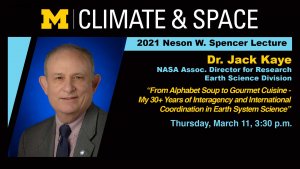Presented By: Climate and Space Sciences and Engineering
2021 Nelson W. Spencer Lecture: Dr. Jack Kaye

The Climate and Space Sciences and Engineering department is very pleased to welcome Dr. Jack Kaye of the National Aeronautics and Space Administration (NASA) as our 2021 Spencer Lecturer.
Dr. Kaye is Associate Director for Research of the Earth Science Division (ESD) in NASA's Science Mission Directorate (SMD).
"From Alphabet Soup to Gourmet Cuisine - My 30+ Years of Interagency and International Coordination in Earth System Science"
The Earth is a complicated system that is driven by a mix of naturally-occurring and human-induced forcings, and its study requires a variety of integrated approaches addressing multiple Earth system components (atmosphere, hydrosphere, cryosphere, biosphere, lithosphere) and the processes that couple them, now combined into the overall subject of Earth System Science. Besides being simply an object of scientific study, Earth is also our collective home, and its response to natural and human change affects the lives of today’s and tomorrow’s global citizens, making Earth System Science a rich subject for both scientific research and for the application of the results of that research to policy and decision making. The scope and breadth of the topic makes the topic too big to be addressed fully by any one organization, so coordination across organizations, both domestically and internationally, becomes a key consideration in our respective efforts. The resulting coordination affects all aspects, including observations (from space, air, and surface), modeling, process research, assessment, and applications. In the US, this has meant interagency coordination, both bilateral and multilateral, while internationally, the coordination has also involved bilateral and multilateral relationships, the latter including those that are both government-driven and community-driven. In this talk, my experience in interagency and international coordination will be reviewed, along with some highlights, lessons learned, and thoughts about the future. Interagency examples will include the US Global Change Research Program and its National Climate Assessment, the Office of the Federal Coordinator for Meteorology and the National Polar Orbiting Environmental Satellite System, while international examples will include the World Climate Research Program, the World Meteorological Organization, and bilateral cooperation with several international partners on Space Shuttle and Satellite programs.
Please join us!
Contact: Laura Hopkins, lhopkins@umich.edu
Dr. Kaye is Associate Director for Research of the Earth Science Division (ESD) in NASA's Science Mission Directorate (SMD).
"From Alphabet Soup to Gourmet Cuisine - My 30+ Years of Interagency and International Coordination in Earth System Science"
The Earth is a complicated system that is driven by a mix of naturally-occurring and human-induced forcings, and its study requires a variety of integrated approaches addressing multiple Earth system components (atmosphere, hydrosphere, cryosphere, biosphere, lithosphere) and the processes that couple them, now combined into the overall subject of Earth System Science. Besides being simply an object of scientific study, Earth is also our collective home, and its response to natural and human change affects the lives of today’s and tomorrow’s global citizens, making Earth System Science a rich subject for both scientific research and for the application of the results of that research to policy and decision making. The scope and breadth of the topic makes the topic too big to be addressed fully by any one organization, so coordination across organizations, both domestically and internationally, becomes a key consideration in our respective efforts. The resulting coordination affects all aspects, including observations (from space, air, and surface), modeling, process research, assessment, and applications. In the US, this has meant interagency coordination, both bilateral and multilateral, while internationally, the coordination has also involved bilateral and multilateral relationships, the latter including those that are both government-driven and community-driven. In this talk, my experience in interagency and international coordination will be reviewed, along with some highlights, lessons learned, and thoughts about the future. Interagency examples will include the US Global Change Research Program and its National Climate Assessment, the Office of the Federal Coordinator for Meteorology and the National Polar Orbiting Environmental Satellite System, while international examples will include the World Climate Research Program, the World Meteorological Organization, and bilateral cooperation with several international partners on Space Shuttle and Satellite programs.
Please join us!
Contact: Laura Hopkins, lhopkins@umich.edu